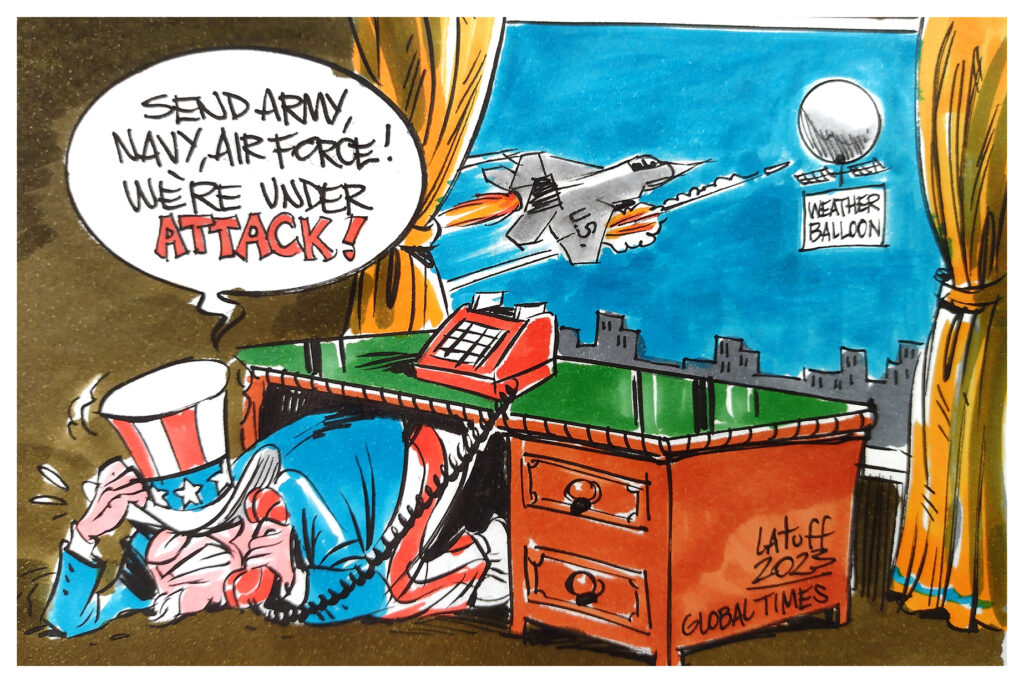While US officials and the media continue their hype over the unmanned Chinese airship for civilian use in an attempt to accuse the Chinese side of refusing to communicate, the Chinese Foreign Ministry emphasized on Wednesday that any attempt to exaggerate or hype up the “China threat” will be detrimental to building mutual trust between the two countries. When it comes to the question about whether there are still effective communication and crisis management channels between the two sides, it also depends on the US, not China, Chinese experts said.
Chargé d’Affaires of the Chinese Embassy in the US Xu Xueyuan on Tuesday local time lodged, upon instruction, stern representations with senior officials of the US Department of State and White House National Security Council on the US attack on a Chinese unmanned civilian airship by force.
Chinese Vice Foreign Minister Xie Feng on Sunday lodged a solemn representation to the US Embassy in China over the US shooting down the airship on Saturday.
US navy divers began pulling pieces of the airship from the depths of the ocean floor on Tuesday, the AP reported. US counterintelligence teams hope to learn more about the sensors and other equipment on the remnants of the airship, the media report said.
Despite China has repeatedly shared information on the unintended entry of the unmanned Chinese civilian airship into US airspace, the US not only went ahead with the use of force to take down the airship but has also continued hyping the incident, creating more obstacles for bilateral relations that were already strained over numerous issues, including the US high-tech crackdown on China and the Taiwan question.
The Pentagon claimed on Tuesday that “China declined a US request for a secure call” between Secretary of Defense Lloyd Austin and his Chinese counterpart after the airship was downed, US media reported.
US intelligence also linked the civilian balloon to a surveillance program run by the Chinese People’s Liberation Army, according to the Washington Post. US officials have also been briefing allies and partners over the incident, media reported.
Commenting on the reported briefings, Mao Ning, spokesperson of the Chinese Foreign Ministry, said “It’s a matter for the US itself and I don’t want to comment on that. But I hope the US will communicate with other countries based on facts.”
The US’ downing of the unmanned Chinese civilian airship by force is unacceptable and irresponsible. China has lodged a stern protest. Exaggerating or hyping up the “China threat” narrative is not conducive to building trust or improving ties between our two countries, nor can it make the US safer, Mao said.
The accusations by the US that China has rejected communication are untrue, Chinese observers argued, as China repeatedly told the US that the entry of the airship into US airspace was unintended. Also, as the unmanned airship is found to be a civilian airship used for mainly meteorological research purposes, it would be meaningless for the Chinese military to communicate with the Pentagon as the matter does not involve US security or defense issues.
‘Contradictory mentality’
Although China repeatedly informed the US about the situation, the US insisted on taking arbitrary, irrational and destructive actions, which are irresponsible, Lü Xiang, an expert on US studies at the Chinese Academy of Social Sciences, told the Global Times on Wednesday.
The US has a contradictory attitude on this issue. On the one hand, it admitted that the balloon poses no threat to the US, but on the other hand, it destroyed it by force, Lü said. “Maybe the US wants to steal some Chinese technologies if they refuse to return the remnants,” he said.
Some Chinese analysts believe that such a high-altitude balloon is equipped with cutting-edge technologies in terms of material, which the US may not have mastered.
Over the past few days, the world has been closely watching “the balloon episode” with growing concerns that it could further complicate US-China relations and cause lasting damage.
During his State of the Union address on Tuesday, US President Joe Biden said he is “committed to working with China where it can advance American interests and benefit the world… if China threatens our sovereignty, we will act to protect our country. And we did.” It is believed that such remarks were referred to the balloon incident.
Whether there are effective communication and crisis management channels depends on the US, not China, Lü said. “What the US should do is to return the remnants of the airship to China.”
Diao Daming, an associate professor at the Renmin University of China in Beijing, told the Global Times on Wednesday that the US’ immediate aggressive attack on the airship was not in line with international practice, and if certain US politicians continue hyping the matter, it will only further expose their ill-intent to jeopardize bilateral relations.
“Obviously, the balloon episode won’t end soon,” Li Haidong, a professor at the Institute of International Relations at the China Foreign Affairs University, told the Global Times on Wednesday.
The US is now collecting and interpreting information about the balloon. The story is not ended, and someone has even encouraged the US to put a balloon in China’s airspace in retaliation, Li said.
The expert warned that China-US relations will become more competitive and conflict-driven because of the US misconception and actions. Under the criticism and hype of the Republicans and some extremist voices, Biden would find it more difficult to amend the China-US relationship, Li said.
(Global Times)




